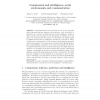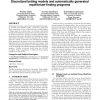120 search results - page 14 / 24 » From Artificial Societies to New Social Science Theory |
CSE
2009
IEEE
14 years 3 months ago
2009
IEEE
—The hidden knowledge in social networks data can be regarded as an important resource for criminal investigations which can help finding the structure and organization of a crim...
AGI
2011
13 years 6 days ago
2011
Compression has been advocated as one of the principles which pervades inductive inference and prediction - and, from there, it has also been recurrent in definitions and tests of...
PDC
2004
ACM
14 years 2 months ago
2004
ACM
To compare the outcomes of participatory and user-centered contextual design, case study methods and the Activity Checklist derived from Activity Theory are used to analyze two sy...
RECSYS
2009
ACM
14 years 3 months ago
2009
ACM
We present an incentive-based architecture for providing recommendations in a social network. We maintain a distinct reputation system for each individual and we rely on users to ...
ATAL
2008
Springer
13 years 10 months ago
2008
Springer
We present Tartanian, a game theory-based player for headsup no-limit Texas Hold'em poker. Tartanian is built from three components. First, to deal with the virtually infinit...


